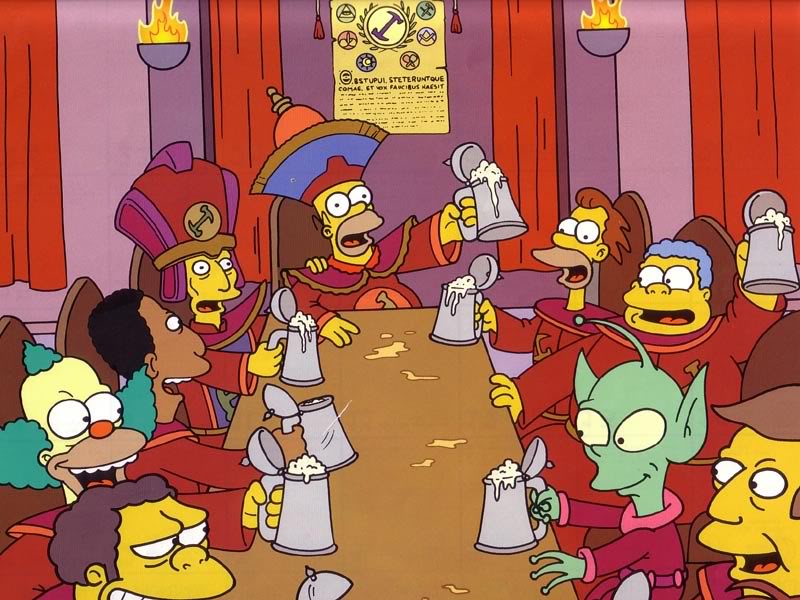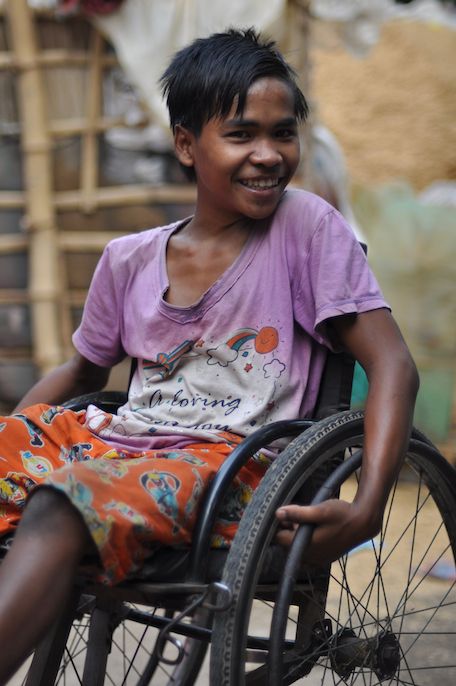When talking about poverty and development, we seem to spend a lot of time and energy lamenting what isn't on the agenda. The more important question is however, who sets the agenda?
"Who holds back the electric car? Who makes Steve Guttenberg a star? We do! We do!"

In the Simpsons episode, "Homer the Great," the Stonecutters, an ancient secret society, are responsible for controlling the way society operates. They set the agenda. But in our world, who is truly responsible -- those attending U.N. meetings in New York or ordinary people?
This week, the U.N. held a high-level meeting to discuss the outcomes for people with disabilities in the Millennium Development Goals (MDGs) and other internationally-agreed goals. As we reach the post-2015 agenda, there is no doubt that the MDGs have failed the over 1 billion people living with disability in the world.
Although the eight MDGs touch on areas, such as education and health, that involve people with disabilities, there is no explicit mention of those with disabilities within these targets. In working out how over 1 billion, or over 15 percent of the world's population could be ignored, it's important to reflect on how the MDGs were formed in the first place.
The process itself was haphazard and took many years of negotiations. Although there were moments where certain individuals could influence outcomes, they are largely based on the amount of power certain groups could "wield," (economic, political, moral and even military).
Where does this leave those who have never been high on the international agenda? It makes it difficult for those to get on the agenda, clearly. Action was consolidated around those areas that were already deemed to be important, yet for those who were forgotten, they remained so. Simply put, the MDGs only reinforce areas of need where people have already been able to wield power.
The organization I have been working with, CABDICO, has recently started a new project in response to the overwhelming lack of comprehensive services in speech therapy. These services aim to help those with communication and swallowing disorders.
Recent research indicates that there are over 600,000 people in Cambodia who lack access to these basic services. The implications of this are critical.
People with untreated swallowing disorders are 13 times more likely to suffer premature death than those who are not. This is because they are at risk of aspirating (food or liquid entering the lungs) and hence contracting a pneumonia (chest infection). People with communication problems face isolation and low opportunities to participate in schools, work or their community. Mental health is also majorly impacted.
Even on a purely economic level, supporting this project makes sense. This is because the economic cost of untreated swallowing disorders is huge. Research in the UK has shown that a £1 investment in speech therapy services for people with swallowing problems generates £2.3 in health care cost savings through avoided cases of chest infections. This could result in significant savings for the health sector in Cambodia.
Every time that CABDICO has presented this concept to traditional donors the response has been that a important area has been identified, and that funding for this need is crucial. However, since disability is not their priority, these donors weren't able to fund it.
This frustration is something that disability NGOs face on an almost daily basis. If those in positions of power have not identified disability as a priority how do we, as a society, determine whether it is one?

Chhon Chuon, one of the children CABDICO treats, who is now a important member of the community due to their work.
There is an interesting parallel to be made with what is now occurring in Australia in regards to climate change. The Climate Commission was set up by the previous Australian government in 2011 to increase public awareness of climate change science. After the recent election, the new conservative government, not the most ardent believers in climate change, scrapped the organization, claiming it would save $580,000 this financial year and $1.6 million in the following years.
This decision was announced on a Thursday. On the next Tuesday, the members of the former Climate Commission announced that they would work pro bono if necessary, under the banner of a new organisation called the Climate Council.
In response to this news, donations came in from all parts of the country and in one day, they managed to raise $400,000 from private donors. After only 24 hours, they were well on their way to raising the $580,000 that they required per year to run the organization.
Clearly, the people had spoken. Even if the government thought otherwise, those ordinary Australians who donated showed that they believed in the importance climate change. They collectively put climate change back on the agenda.
I wonder if the same thing could happen in disability: if ordinary people could show those that are in positions of power that this is an important issue that cannot afford to be overlooked again and again.
Due to a lack of interest from traditional donors, CABDICO has set up their own crowdfunding page, where individuals can give amounts of money, small or large, to fund programs that support people with disabilities.
Maybe this is the one way that ordinary people can shift the agenda, by creating a groundswell of support. One can only hope so.
If you are interested in supporting CABDICO's concept, and assisting the over 600,000 people who lack access to vital services, you can visit here.